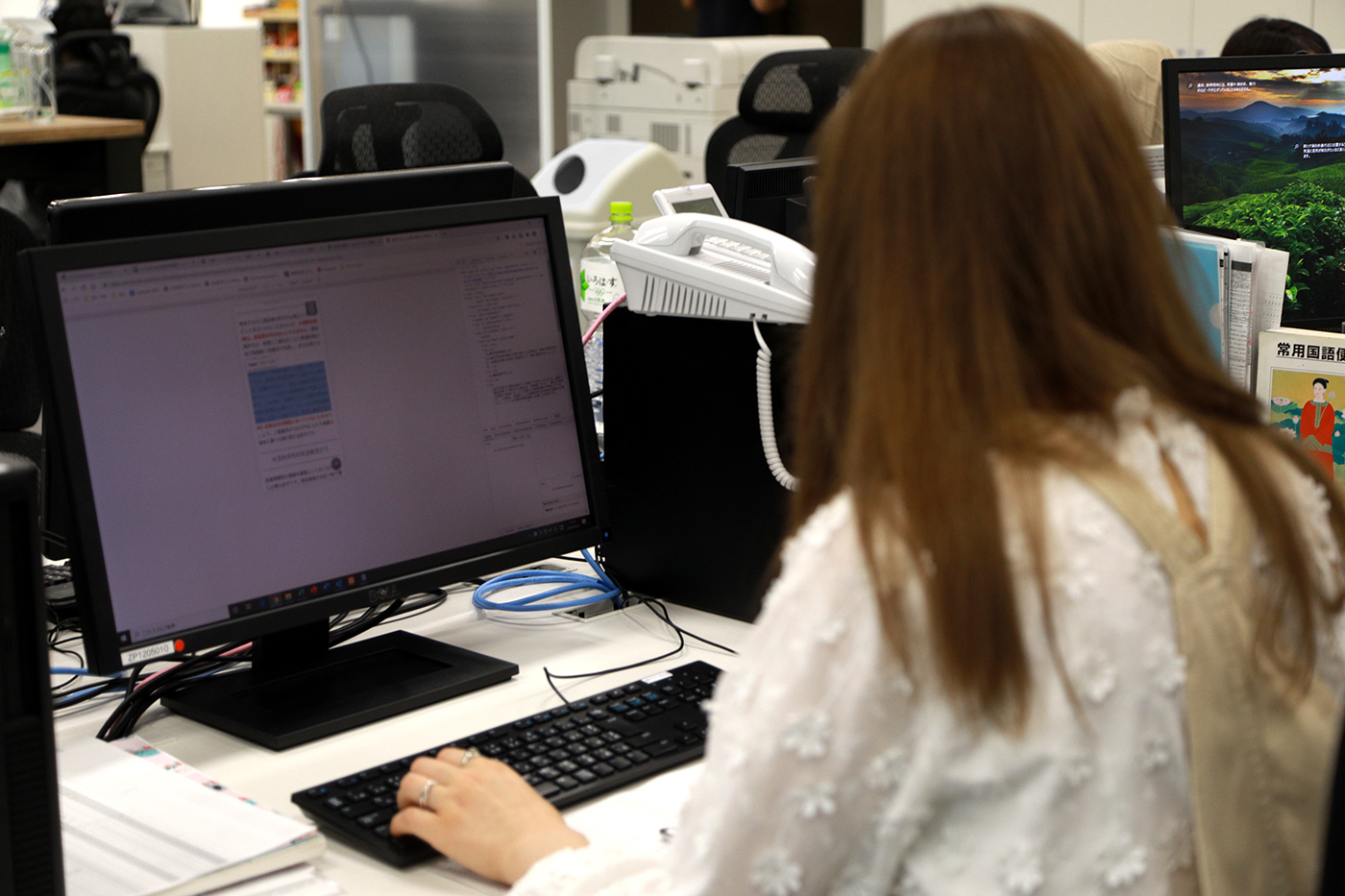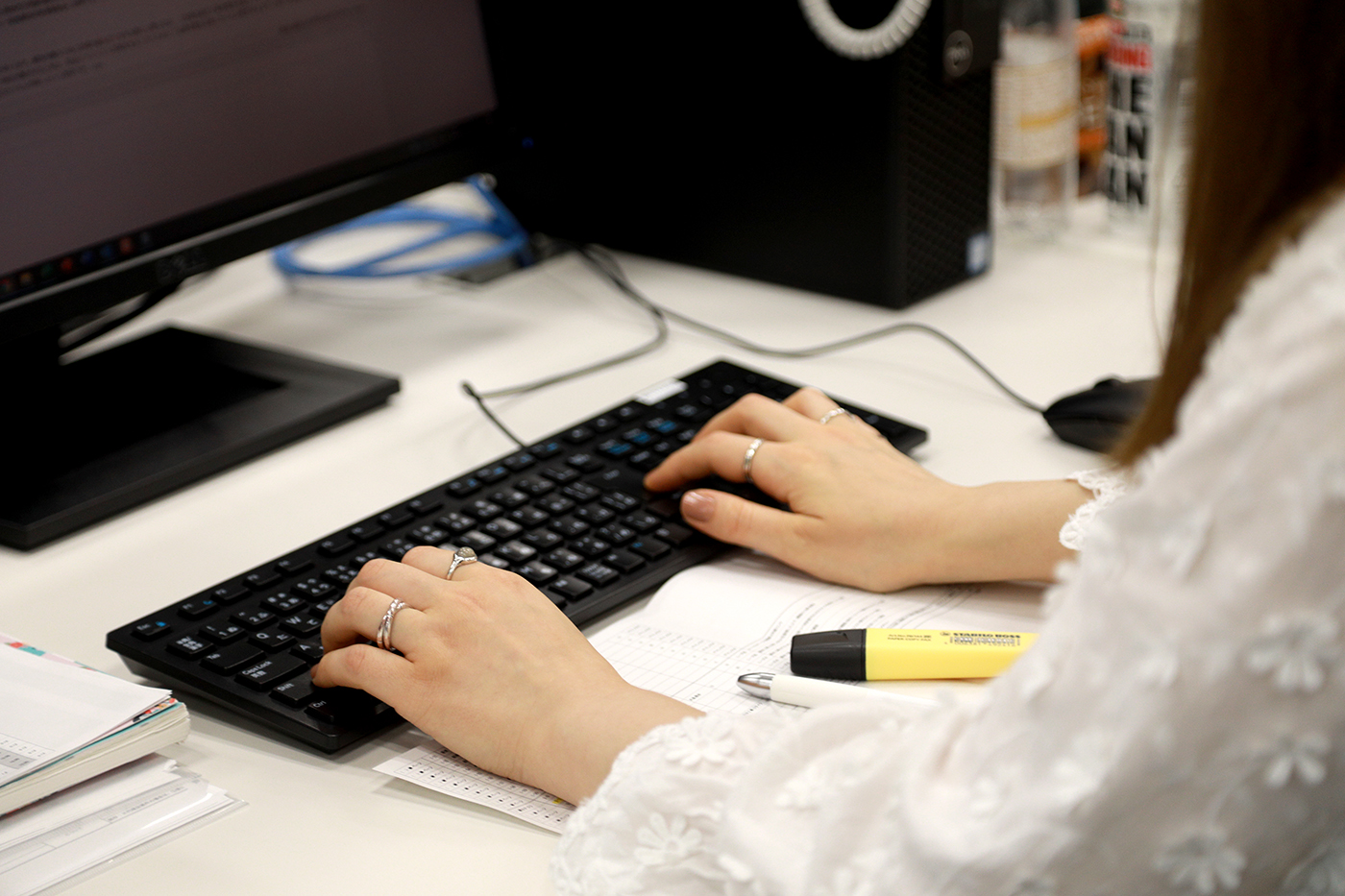Working as a Web Marketer in Japan

by Florian
Working in the Japanese marketing sector requires high language skills, among other things. In this interview, we talked to Viktoryia from Belarus about communicating with clients, editing, and coming up with strategies that work. (※This interview was translated from Japanese.)
コンテンツ
Viktoryia’s Profile
Name: Viktoryia (26)
Country: Belarus
Major: Japanese Studies
Industry: IT/Web
Japanese Level: N1
Work status: New graduate (2nd year)
Job hunt: ~10 job fairs, ~15 application, 2 job offers
Introduction & Coming to Japan
Florian: OK, first off – self-introduction, please!
Viktoryia: I’m Viktoryia. I’m from Belarus and have been living in Japan for three years. In universities, I studies Japanese language and literature at the department for International Relations.
F: How long have you been studying Japanese?
V: It’s a bit embarrassing, but … I studied five years in university and have been here for three, plus one… eight, nine years? Well, the time when I properly studied were those five years at uni…
F: …and now that you’re living here, you’re also doing other things. I see. OK, then … I’m sorry to ask such an ordinary question, but what made you come to Japan?
V: Well, at our university, we had a study abroad program, and one day, we got an invitation along the lines of “interested in going to Japan?” So I decided to go.
F: Ah, I also meant to ask about what made you interested in Japan in the first place! (laughs)
V: For me, it was music. I’ve been interested in Japanese music since I was around 14 or 15 years old. It was what motivated me to study Japanese and choose my major at university.
F: So you were already studying Japanese in high school?
V: Hmmm … half-heartedly, maybe? I was like “I’m going to learn Hiragana!” and studied on my own just a bit.
F: So you started taking classes after entering university, did your year abroad … and then searched for a job in Japan.
V: No, actually I went to Japan in my third year, then returned, graduated from uni, worked for about one year and then came to Japan again as a post-grad student on the MEXT scholarship program.
F: What kind of research did you do?
V: I researched Japanese pronunciation, including things like pitch accent, but also vocalization. For example, in Japanese, you have the different “columns” of syllables, right? There’s the “a” column, the “ka” column … and also the “ra” column. What’s interesting is that when Japanese people get angry or are especially happy, they sometimes pronounce the syllables in the “ra” column like you would pronounce them in Russian, with a rolling “r”. But if you ask regular people, no one can tell you why that happens… so I did my research on this topic.
Everyday work as a Website Director
F: And you job, does it…
V: No, it doesn’t have anything to do with that! (laughs) Now, I’m working as a web director*.
(* Outside of Japan, the term “Web Director” is not very common. More commonly used job titles that match the work routine as described in this article are “Internet/Web Marketer” or “Digital Marketer.”)
F: I’m not sure if all readers are familiar with the term. Can you tell me a bit more about what kind of work you do, explain the flow a bit?
V: OK, so we’re making websites, which are based on keywords. We get those keywords from sales, for example, “custom-built home Tokyo”. Depending on what kind of plan the client has chosen, we’re doing sites with 20 pages, 40 pages, and so on.
After receiving the basic information from sales, we speak to the client ourselves. We ask them about their businesses’ strengths, and what things they want to emphasize. On top of that, we also analyze the market and competing companies and decide on a strategy – how to make the client’s business stand out. At the same time, we’re also thinking about potential customers. We decide on a target audience, and then we put all these things together and create the website.
Once we’ve decided how the site is going to look like, we write up some instruction documents, contact the designers and writers and hand off the work to them. When the writers are finished and send us the texts, we check them both for regular errors and legal stuff. And after the site has gone live, we contact the client one last time.
F: …and you do all of that in Japanese?
V: Yes!
F: Wow! But I assume it doesn’t always go swimmingly. Are there any problems that you or your team run into?
V: Something that happens quite often are differences in perception. For example, sometimes clients tell us about a unique thing they’re doing, but then we do the competitive analysis and realize that almost every competitor is doing it too. It can be difficult to convince them to focus on other strengths they have.
On the other hand, sometimes we have a clear idea of what kind of concept or strategy we want to go with but have trouble coming up with content that clearly targets the customer we have in mind. To stay with the example I gave earlier, for keywords like “custom-built home Osaka”, we might struggle with capturing the characteristics of that area. With area-specific keywords like that, you don’t want a site that could also come up when people search for “custom-built home Tokyo”… Yeah, there are all sorts of challenges! (laughs)
Communicating with Clients
F: You talked about directly talking to clients and convincing them of the strategies you choose. Do you also do that yourself?
V: Well, now with Corona going on I don’t visit the clients directly… but I do talk to them over the phone.
F: …right from when you first entered the company?
V: No, I’ve only been doing that since this year’s April. During my first year, I was a bit further in the back. Sometimes, one client requests multiple sites with different keywords. In those cases, one director acts as a central contact person, and the different sites are delegated to different editors. Until recently, I was one of those “background editors”. But since April, I’ve been given responsibility for direct communication with the clients as well as regular editing work.
F: By the way, how is your Japanese?
V: Well, I have the JLPT N1, but… when I actually talk, I don’t really sound like I do, right? (laughs) Somethings I doubt if I truly passed the test … but on paper, I have the skills.
F: I have N1 too, but when I think of directly talking to people outside of the company, as a representative of sorts… I would be so stressed out! Aren’t you nervous at all?
V: No, I’m always super nervous! At first, I just send the client a simple e-mail greeting. But when you get to the point where you have to schedule the actual hearing, you call them, and then you have to say your name, right? At that point, I always think … what if I get a response like “who are you?” Speaking Japanese is one thing, but the step that comes before the actual conversation – identifying yourself as a non-Japanese person – can feel pretty daunting. So yeah, I’m also nervous in situations like that.
F: So you’re nervous and you have your worries, but until now, there was never an instance where a talk didn’t go well because you were a foreigner?
V: I wonder. (laughs) You can never truly know unless you ask the people directly. As far as I’m aware, it hasn’t happened yet.
One time, at the end of the conversation, a client asked me whether I was a foreigner or Japanese. I didn’t know what to answer! But aside from that, all phone calls that I’ve made have been very … normal. I often think that maybe the clients don’t mind it as much as I think they do.
F: By the way, did your study Business Japanese before entering the company?
V: Hmm, in my fifth year at university, maybe? But we didn’t really learn business talk, just the regular honorific language… how you talk with people in real business situations was something that I learned after I started working, from the ground up.
Rules of Communication
F: What do you think is most important when communicating with clients or colleagues in Japan?
V: I think what you absolutely shouldn’t do, and what I’m still working on myself, is speaking in long sentences. Before I notice, I’m stringing them together, and in the end, I sometimes forget what I wanted to say in the first place. I think it’s very important to start with your point and cut up your sentences into shorter bits of information.
F: Do you think that’s connected to speaking Japanese as a second language? I’ve thought about this myself… once you reach a certain level, do you start talking in longer and longer sentences just to kind of show that you can do it?
V: Hmm… I think it’s just something you pick up on. A lot of natural Japanese communication and Japanese text is like that. Outside of some really specific contexts, sentences just tend to get long.
F: So that’s something that every web director has to kind of sort out, regardless of whether they’re Japanese or not.
V: Yeah, I think so. We were talking about phone calls, but it’s also something you have to pay attention to when editing. After the writers send in their texts, you sometimes have to rewrite stuff here and there so that it fits the target audience better. But one of the big rules of web writing is that you should cut down on long sentences as much as possible. It’s something that gets pointed out a lot to me. “Too long. That’s three lines already – make it shorter!” (laughs)
F: By the way, do you also do all this editing and checking stuff all by yourself?
V: No, I always have to have it checked. I mean, I’m not a native Japanese speaker, my experiences as a director and editor are still very limited, and my writing skills are not that stellar either…
F: Has anything changed since you first entered the company? For example, are there certain areas that you can breeze through now?
V: The amount of red on my first drafts has definitely decreased. Due to some other circumstances, the number of steps we take until the site is finished has increased. But yeah, I’m making less writing mistakes now, the revision cycles have been getting shorter, and the amount of time I’m spending on each revision as well.
Adcive for Job Seekers
F: Do you have any advice for people who are interested in working in the marketing field here in Japan?
V: I think preparing yourself emotionally is very important. What I mean by that is that the Japanese job hunt and the recruitment system here is very … unique, and you have to be ready to go through the whole process. If you aren’t, it’s easy to give up halfway through … that’s what I felt when I was searching for a job here. In my case, I wasn’t really looking for a job in marketing specifically though.
F: How long did it take until you had a job?
V: I started searching in January or February, and I got my first job offer around … September, I think? It took over six months – from a non-Japanese perspective, that’s crazy! You have to do multiple interviews, and I kept dropping out, not passing the tests… I think if you don’t prepare yourself and go into it with the wrong expectations, it’s easy to lose hope.
F: Did you search for jobs in a specific field you were interested in?
V: Yes… I had a few different fields I was interested in. I went to job fairs and contacted companies directly through their websites.
But when I first came in contact with the company I’m working at right now, I was interested in their Japanese Language Education branch. My early interviews were all for positions in that field. But then I learned more about the company, and started to think that I might be interested in web marketing…
F: So you wanted to work using your Japanese, and ended up in marketing. I see… I’d love to ask you more, but I’m afraid our time is up! Thank you for the interview!
V: It was my pleasure!
Any questions?
Interested in working as a web marketer in Japan and still have questions? Ask away in the comments! We’ll check back with Viktoryia and give you some advice about how to prepare and find a job. Viktoryia is working at Zenken Corporation, based in Shinjuku. To find out more about the company, read our article on it over here. You can also visit the recruitment sites (*in Japanese) directly by clicking the buttons below. If the Japan-Marketing combo is your thing, don’t be afraid to apply!
You want to work in Japan?
Find out how others got their jobs!
■ Everyday work as a designer, Tanya from Ukraine
■ Working in Japan without speaking Japanese, Mustaq from India
■ Online Application and the Apparel Industry, Clemence from France
■ More job-hunting advice from your Senpai
Recommended Posts

How to Get Along with Your Japanese Boss
25 5月 2021 - Work, Working Culture

The 10 Most Popular Japanese Companies in 2021
19 5月 2021 - Work






